This is the second intergenerational worship in a series of four at St. Andrew’s United Church in Yorkton. This happened to be Thanksgiving Sunday Sunday so the focus was on gratitude for the gifts of various generations.
This week, I invited people to sit in generational groups (builders, boomers, gen-x, millennials, screeners). I invited people to look at a list of generational characteristics and talk about how they resonate with these attributes. With these characteristics in mind, each group was asked to identify and share with the congregation gifts that they bring to our community of faith. I worked with the youngest group to help interpret and pull out their responses.
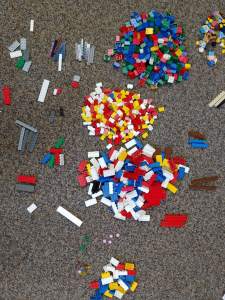 Each group was given a basket of lego containing only one type of lego block. I asked them to build everything they needed for a healthy community using only the lego they had been given.
Each group was given a basket of lego containing only one type of lego block. I asked them to build everything they needed for a healthy community using only the lego they had been given.
The scripture reading was Jeremiah 29:1, 4-7
Reflection:
This passage comes from a time when the people had been exiled. When the Babylonians conquered the Hebrew people, they took all the wealthy people, the leaders, the craftspeople, the artists… anyone who had power or skill so they could be put to use in the empire. They left behind anyone who was poor, unskilled, uneducated or had a disability. These people were left to fend for themselves and without the leadership and organizational skills to form an uprising. Both groups were miserable and unhappy. Their communities were ripped apart and incomplete because groups of people were missing.
Jeremiah’s advice to the people in exile was to settle in and build a new life. Carry on as if life were normal. Find joy and happiness.
When you were building your Lego communities this morning, how easy was it to build everything you needed in a city? When we separate generations, it is like being in exile. Part of who we need to thrive is missing. Churches have a history of separating generations. We have programs for children and different groups for adults. Sometimes it is important to gather with other people of a similar age and stage of life but if we only interact with people in our age group, we are incomplete, and our community doesn’t function the way it should. We miss the gifts that each of the generations brings.
Sometimes it feels more comfortable to only spend time with people our own age. But there’s a whole bunch of research that shows that the generations need each other. Seniors that have relationships with children live longer and healthier, they are able to remain independent longer, they have better mental and physical health, they might find new purpose in life. Children that have relationships with adults do better at school, develop better social and leadership skills, have less anxiety. Being with a different generation might feel a bit foreign. If you are a child, how do you talk to an adult about life? If you are a senior, how do you connect with a teenager? Building these connections can feel like being in a foreign land. Jeremiah is telling the people to pray for the community in which they find themselves. Pray that they will do well and be healthy. It might seem counter-intuitive for the exiles to pray for their enemies and captors but that is what Jeremiah is telling them to do.
He’s telling them to do everything they can to ensure that the people around them thrive. We also need to ensure that all the people in our faith community thrive—not just those in our own generation. Our children need to make sure that our seniors are loved and cared for. Our adults need to make sure that our children know they are loved and feel supported as they navigate a world that seems strange to us.
But in order for this to happen, we need to know each other.
I talked about opportunities that are coming up in our community of faith in the next few weeks that allow us to build relationships across generations. One of these was the ham and meatball supper where adults were challenged to buddy up with a young person to help serve the meal. I had some children help me run the elevator. I’m not sure that anyone else took me up on the challenge. Other opportunities are more intentional and include LOGOS meals, Egnage worship, and Sharing and Service. I’ll be writing about these in future posts as they unfold.
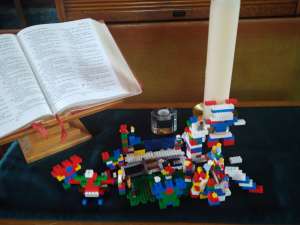 Building a New Community: I asked the groups how it was to build a community using a single type of lego. It was challenging. Some groups were more inventive than others. Now I asked them to get up and move around and work with the other groups to build what we need for a healthy community.
Building a New Community: I asked the groups how it was to build a community using a single type of lego. It was challenging. Some groups were more inventive than others. Now I asked them to get up and move around and work with the other groups to build what we need for a healthy community.
The parts were all put on the communion table together. The parts included areas for recreation, gathering and parks.
Offering Invitation:
We gather as God’s faithful generations in this community. We recognize that each of us has something to offer. We share generously of our time, talents, energy and money for the ministry of this community of faith and your wider ministry through Mission and Service.
Offering Prayer:
God of life, We give thanks for the ways we experience your love through many generations of people. We give thanks that your love has been passed to us so we can share it with others. We give thanks for this community of that serves others. May these gifts be part of your service, here and around the world. Amen.
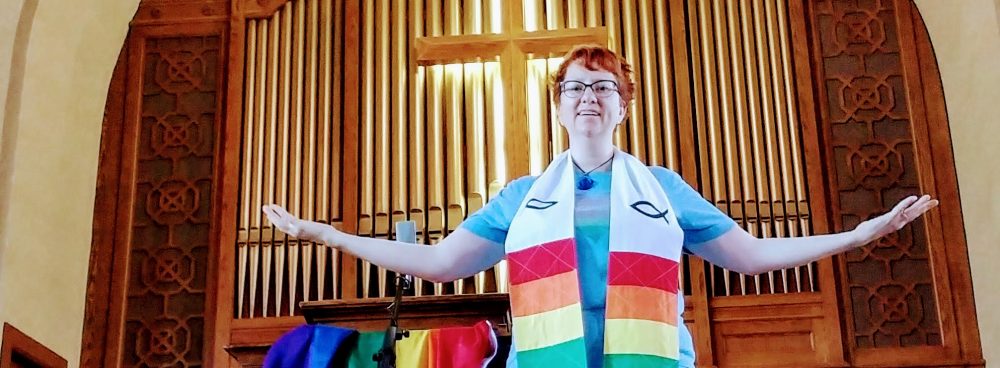
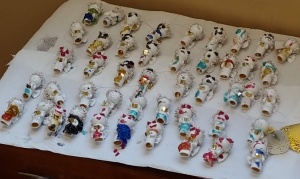 This year we are trying a different way of engaging all ages in the mission of the church. Once a month on a Saturday morning, all ages are invited to gather to work participate in a project that connects with the ministry of the congregation. In October, twelve people gathered to make dried soup mixes for the food shelf. Two hundred ziplocks filled with lentils, rice, pasta and all the seasonings were packed and will be given to anyone who comes to the church looking for food.
This year we are trying a different way of engaging all ages in the mission of the church. Once a month on a Saturday morning, all ages are invited to gather to work participate in a project that connects with the ministry of the congregation. In October, twelve people gathered to make dried soup mixes for the food shelf. Two hundred ziplocks filled with lentils, rice, pasta and all the seasonings were packed and will be given to anyone who comes to the church looking for food.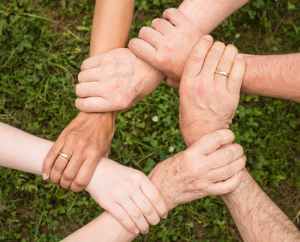
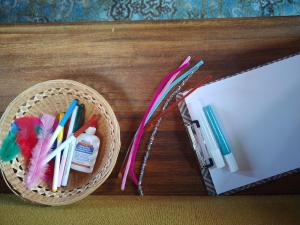 This is the fourth worship in a series focussed on intergenerationality from
This is the fourth worship in a series focussed on intergenerationality from 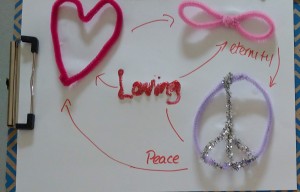
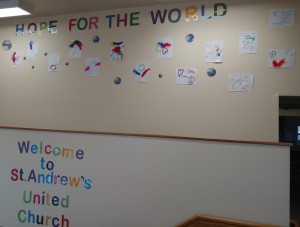 The art was hung on the wall in main entrance of the church building.
The art was hung on the wall in main entrance of the church building.
 Each group was given a basket of lego containing only one type of lego block. I asked them to build everything they needed for a healthy community using only the lego they had been given.
Each group was given a basket of lego containing only one type of lego block. I asked them to build everything they needed for a healthy community using only the lego they had been given. Building a New Community: I asked the groups how it was to build a community using a single type of lego. It was challenging. Some groups were more inventive than others. Now I asked them to get up and move around and work with the other groups to build what we need for a healthy community.
Building a New Community: I asked the groups how it was to build a community using a single type of lego. It was challenging. Some groups were more inventive than others. Now I asked them to get up and move around and work with the other groups to build what we need for a healthy community.

 September 22 was Cosmos Sunday at
September 22 was Cosmos Sunday at 
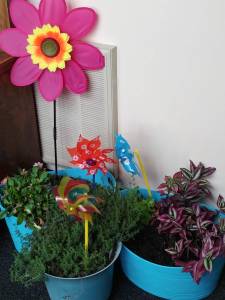 On September 15, we celebrated Storm Sunday as the second Sunday of Season of Creation. As people arrived for worship they were given a raindrop made out of wax crayon melted between wax paper. Instructions can be found
On September 15, we celebrated Storm Sunday as the second Sunday of Season of Creation. As people arrived for worship they were given a raindrop made out of wax crayon melted between wax paper. Instructions can be found  To get us thinking about storms I used a clip of
To get us thinking about storms I used a clip of